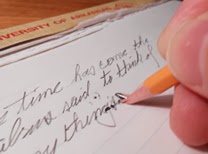Podcast Audio-Conferencing
 Does your phone have a Conference button? I'm realizing that I've been under-utilizing this feature and have recently begun to take better advantage of its capacity to get consensus or collect team ideas without making multiple one-on-one calls.
Does your phone have a Conference button? I'm realizing that I've been under-utilizing this feature and have recently begun to take better advantage of its capacity to get consensus or collect team ideas without making multiple one-on-one calls.Advances in the blogging movement however transform my phone and conference button into something almost unimagineable. With a couple of keytaps, my phone transforms into a recording studio with up to six guests for an attached web-based radio station with global syndication! Whew, sounds like a real whopper, doesn't it. It isn't. Listen.
 This is an audio blog, and making this show with Norr Carr, columnist with eSchoolNews, couldn't have been more simple. The current buzz phrase for these things is podcast, named after the ubiquitous audio and music players called iPods which grab audio from computers for mobile listening.
This is an audio blog, and making this show with Norr Carr, columnist with eSchoolNews, couldn't have been more simple. The current buzz phrase for these things is podcast, named after the ubiquitous audio and music players called iPods which grab audio from computers for mobile listening.  Yet desktop media players and other computer mobile products and even cell phones can all play the podcasts. Podcasting adds new elements to CROP's problem solving stage. The Evoke stage uses phones as a new composition tool. The Assess stage provides the feedback of a conference call, and the Publish stage has a new tool, providing global syndication of published audio.
Yet desktop media players and other computer mobile products and even cell phones can all play the podcasts. Podcasting adds new elements to CROP's problem solving stage. The Evoke stage uses phones as a new composition tool. The Assess stage provides the feedback of a conference call, and the Publish stage has a new tool, providing global syndication of published audio.How simple? When I realize that a phone conversation has some universal appeal, I can explain that our dialog would benefit a much larger audience and ask if we can "rewind" a bit of it, and make a podcast. If we agree, I tap the Conference button, dial my podcast system phone number, enter my password, tap my phone's conference button again and I'm recording our dialog until I tap the # key on the phone. Once tapped, the recording system automatically converts the audio it was recording into an mp3 file, links it to my designated blog, inserts a player icon, and notifies the syndication service that a new posting has arrived. Other than my phone minutes, the service is a free add-on of the free blog service site, www.blogger.com.
But it is not quite a podcast yet unless the syndication link (newsfeed) is pointed to by Feedburner, and the web address of the audio file is entered in the link field. Setting up the link of course happens after the blog is recorded.
Future competition is promised by others planning similar podcast call service such as www.odeo.com. Toll free numbers are in the promised plans of garageband.com.
Whether for solo orations without a conference button or for multiple conferencing guests, a new age of oral communication has arrived. And using phones is just the tip of the podcasting iceberg. The ancient Greek orators would have an honored place is this new world.


Comments
=)